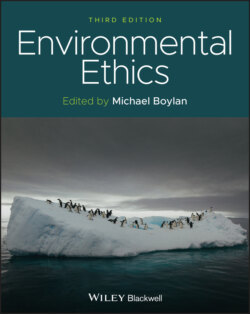Читать книгу Environmental Ethics - Группа авторов - Страница 44
Mutual Coercion Mutually Agreed Upon
ОглавлениеThe social arrangements that produce responsibility are arrangements that create coercion, of some sort. Consider bank-robbing. The man who takes money from a bank acts as if the bank were a commons. How do we prevent such action? Certainly not by trying to control his behavior solely by a verbal appeal to his sense of responsibility. Rather than rely on propaganda we follow Frankel’s lead and insist that a bank is not a commons; we seek the definite social arrangements that will keep it from becoming a commons. That we thereby infringe on the freedom of would-be robbers we neither deny nor regret.
The morality of bank-robbing is particularly easy to understand because we accept complete prohibition of this activity. We are willing to say “Thou shalt not rob banks,” without providing for exceptions. But temperance also can be created by coercion. Taxing is a good coercive device. To keep downtown shoppers temperate in their use of parking spaces we introduce parking meters for short periods, and traffic fines for longer ones. We need not actually forbid a citizen to park as long as he wants to; we need merely make it increasingly expensive for him to do so. Not prohibition, but carefully biased options are what we offer him. A Madison Avenue man might call this persuasion; I prefer the greater candor of the word coercion.
Coercion is a dirty word to most liberals now, but it need not forever be so. As with the four-letter words, its dirtiness can be cleansed away by exposure to the light, by saying it over and over without apology or embarrassment. To many, the word coercion implies arbitrary decisions of distant and irresponsible bureaucrats; but this is not a necessary part of its meaning. The only kind of coercion I recommend is mutual coercion, mutually agreed upon by the majority of the people affected.
To say that we mutually agree to coercion is not to say that we are required to enjoy it, or even to pretend we enjoy it. Who enjoys taxes? We all grumble about them. But we accept compulsory taxes because we recognize that voluntary taxes would favor the conscienceless. We institute and (grumblingly) support taxes and other coercive devices to escape the horror of the commons.
An alternative to the commons need not be perfectly just to be preferable. With real estate and other material goods, the alternative we have chosen is the institution of private property coupled with legal inheritance. Is this system perfectly just? As a genetically trained biologist I deny that it is. It seems to me that if there are to be differences in individual inheritance, legal possession should be perfectly correlated with biological inheritance, namely that those who are biologically more fit to be the custodians of property and power should legally inherit more. But genetic recombination continually makes a mockery of the doctrine of “like father, like son” implicit in our laws of legal inheritance. An idiot can inherit millions, and a trust fund can keep his estate intact. We must admit that our legal system of private property plus inheritance is unjust, but we put up with it because we are not convinced, at the moment, that anyone has invented a better system. The alternative of the commons is too horrifying to contemplate. Injustice is preferable to total ruin.
It is one of the peculiarities of the warfare between reform and the status quo that it is thoughtlessly governed by a double standard. Whenever a reform measure is proposed it is often defeated when its opponents triumphantly discover a flaw in it. As Kingsley Davis has pointed out (21), worshippers of the status quo sometimes imply that no reform is possible without unanimous agreement, an implication contrary to historical fact. As nearly as I can make out, automatic rejection of proposed reforms is based on one of two unconscious assumptions: (i) that the status quo is perfect or (ii) that the choice we face is between reform and no action; if the proposed reform is imperfect, we presumably should take no action at all, while we wait for a perfect proposal.
But we can never do nothing. That which we have done for thousands of years is also action. It also produces evils. Once we are aware that the status quo is action, we can then compare its discoverable advantages and disadvantages with the predicted advantages and disadvantages of the proposed reform, discounting as best we can for our lack of experience. On the basis of such a comparison, we can make a rational decision which will not involve the unworkable assumption that only perfect systems are tolerable.
